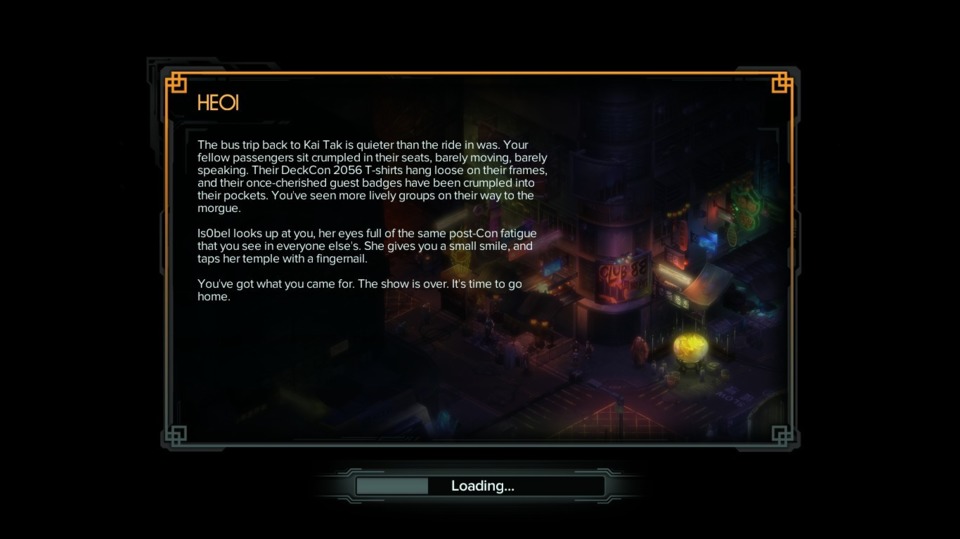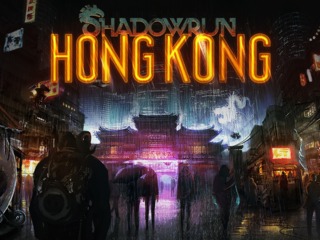
It has been a while since I played Shadowrun: Dragonfall, Harebrained Schemes's prior outing in the cyberpunk-slash-fantasy universe of the table-top game Shadowrun, but it's both heartening and a little discouraging to discover very little has changed in Shadowrun: Hong Kong, the third and so far final entry in their Shadowrun Returns series. Obviously, there's a brand new setting - Kowloon Bay of the titular Special Administrative Region of China - and a new set of characters to work alongside and bond with, but most of the trappings are as familiar as always. When Harebrained Schemes originally developed Shadowrun Returns, the intent was to create a foundation for future adventures - either from themselves with additional assets and tweaks, or from an enormous community of creators who wanted to try their hand at their own cyberpunk adventures or had already been doing so for years with table-top campaigns. Unfortunately, what we got in that foundation level in terms of tools and customization options were a little thin on the ground. Shadowrun is, like any campaign setting that's been around for a while, a very detailed and elaborate world that multiple authors and designers have contributed to over the years; Shadowrun Returns instead felt like it had the bare essentials for a beginner-level adventure (which was, appropriately, what Shadowrun Returns's built-in default campaign Dead Man's Switch was intended to be) that the developers would return to and continue to expand, but only marginally.
That isn't to say that Shadowrun Hong Kong doesn't have any new innovations or improvements. For one, the "Matrix" - Shadowrun's term for its VR-driven internet equivalent, long in use before the Wachowskis' movies came along - now operates with a set of new rules where you stealth your way past "Watcher ICs" with fixed patrols and have to complete multi-stage hacking mini-games (basically two different types of memory challenge with a strict timer to psyche you out) to pass barriers for that good, good paydata and key info (like, say, the password to a nearby door or safe). The game's XCOM-esque turn-based strategic combat quickly emphasizes the importance of cover - the tutorial fight includes an unseen sniper who will take you out quickly if you're out in the open - and the equally vital necessity of a balanced team of shadowrunners (specialized mercenaries who illegally act off the grid) to cover all your bases. As with Dragonfall, the "default" team - that is, the NPCs with the most personality and their own companion missions - provide all the class options you might need, even factoring in how you chose to spec your custom-built protagonist. For instance, the player meets their adoptive brother Duncan early on, and without realizing it I'd somehow managed to create a character with the same combat role: a long-range weapons expert. Even though I don't take Duncan on any missions, having made him redundant, you can still talk to him between the game's missions and move his story arc along. The same is true for Gobbet, a shameless ork shaman who worships Rat, and Is0bel, a terminally shy dwarf decker (i.e. hacker); you may have rolled a shaman or a decker yourself and made either of them the one who sits at home for every mission, but they're still around to dispense wisdom. (For what it's worth, I might recommend either those two classes because their dominant stats - shaman uses charisma, deckers use intelligence - have additional properties that are useful for a party leader: respectively, charisma gives you new "etiquettes", or expertise in talking to specific groups like corporate suits or gang members that offers unique conversation options, while intelligence is useful for solving puzzles.)

Speaking of missions, each Shadowrun game is set up specifically to be episodic in the sense that most of the gameplay takes place in these independent set-piece missions that usually have no bearing on the main plot and simply serve to keep you in the black. They're not so much side-quests as a series of vignettes that alternatively glamorize and deprecate the dangerous life of a shadowrunner as well as establishing the world and its lore, while subtly shifting the perceptions of those around you in your hub location of Heoi - both as you establish yourself as an experienced shadowrunner and the way your character specifically approaches problems in either a merciful or ruthless fashion (though it doesn't go as far as some game-wide morality meter that people react to, a la Mass Effect's Paragon/Renegade slider). This gradual crawl towards legitimacy is evinced by how better equipment keeps showing up at the local vendors, as if to suggest that you might finally be ready for (and can afford) the top-shelf gear. Of course, the small number of available options for equipment and the like remains a sticking point for me - there's very little room for customizing your character with distinctive gear that boasts some unusual min-max combinations, beyond buying whatever the best weapon and armor are for your particular build, which is a huge departure from the massive variety of named (and backstoried!) weapons, armors and accessories in Pillars of Eternity II: Deadfire, which I finished a few weeks ago. (In its defense, I will say that this particular Shadowrun game will at least let you mix and match abilities for custom class hybrids during character creation.) Since your fellow shadowrunners all receive their equal cut of the payout after a mission's over, you'll find that they've automatically kept themselves upgraded with the best available gear too, at least for the most part.
Beyond more story-specific stuff, which I have to admit I've yet to get too deep into as I keep my shadowrunning nose to the grindstone with various robberies and espionage missions, there's not a whole lot to distinguish Hong Kong and Dragonfall beyond the aforementioned tweaks to the Matrix jacking. Harebrained Schemes clearly built their Shadowrun engine to last, and have since gone on to provide a similar treatment to the BattleTech table-top setting, so I can't begrudge them for not moving past the fundamentals and instead choosing to concentrate on the stories they want to tell in these universes. The downside is that these still feel like barebone versions of otherwise expansive campaign settings with little by way of the deep customization options available in most RPGs. However, if you're the type to get paralyzed by choice in the more comprehensive CRPGs out there - especially where things like spellbooks and class specializations come into play - the game's streamlining of the more micromanagement-y aspects of the genre for a greater narrative focus might be more to your liking, as might its unusual juxtaposition of fantasy and cyberpunk. However, you'll almost certainly want to start with Dragonfall if these games pique your interest.
Rating: 4 out of 5.
| < Back to 89: Hollow Knight | > Forward to 91: A Hat in Time |

Log in to comment